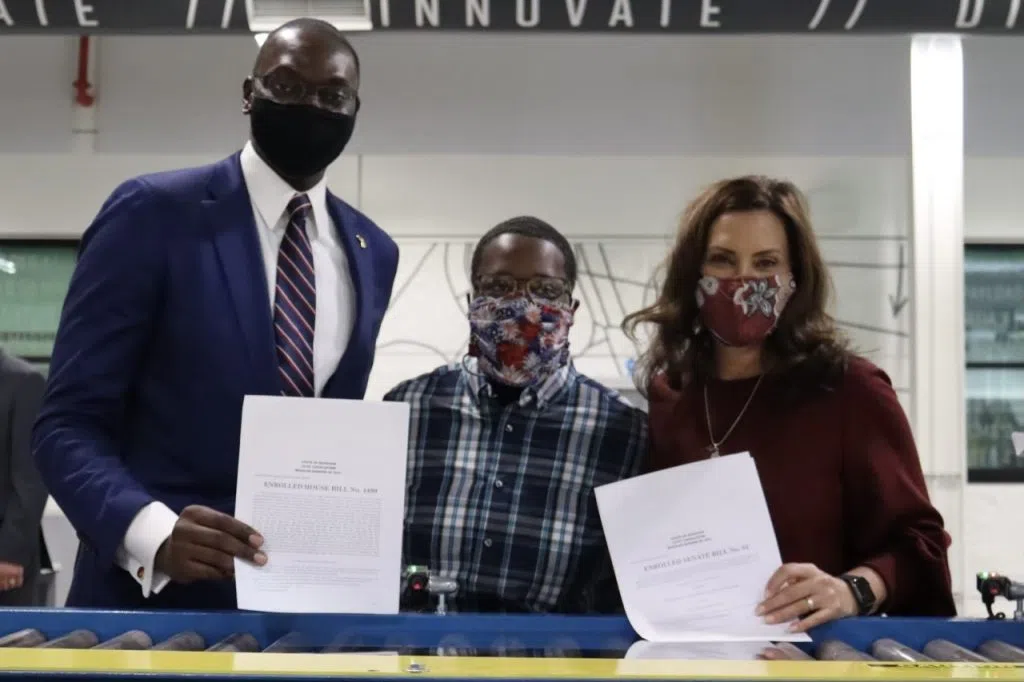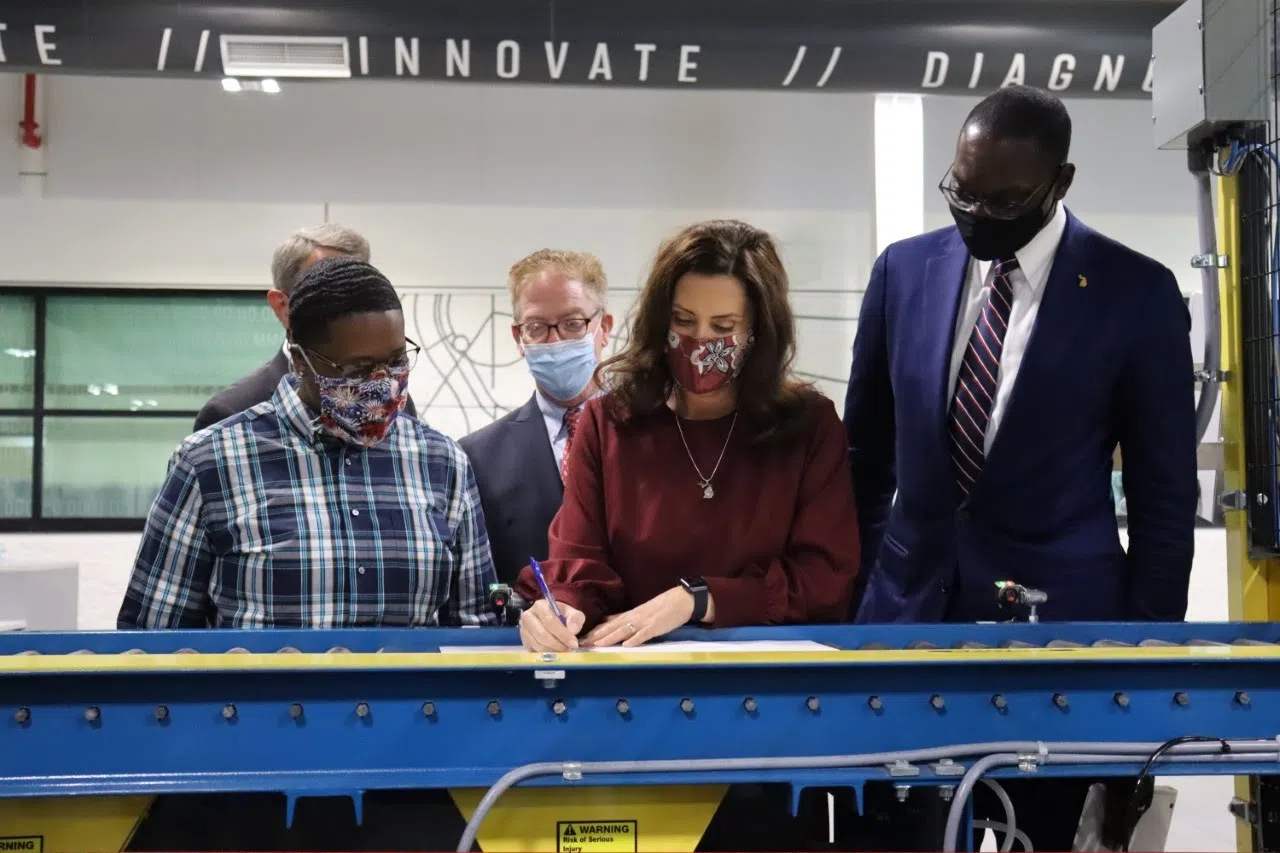LANSING, MI (WKZO AM/FM) – Wednesday, at the Lansing Community College West Campus, Governor Gretchen Whitmer today signed SB 82 and HB 4400, which ensure funding is now in place for Fiscal Year 2022.
The budget is set to take effect on October 1.
When combined with the K-12 school aid budget signed earlier this year, the total budget invests $70 billion into Michigan’s future.

Governor Whitmer speaks on 2022 budget. (Photo courtesy Office of Governor Whitmer).
Whitmer says the budget provides strong investments for the state’s economy, lowers the cost of childcare for Michigan’s working families, invests in education and skills for Michigan’s workforce, protects access to affordable healthcare, prioritizes cleaning up water and the environment, and rebuilds crumbling bridges.
“This is a budget that puts Michiganders first. We are coming together to grow the middle class, support small businesses, and invest in our communities,” Governor Whitmer said. “This is a comprehensive budge
The budget fully funds Michigan Reconnect and Futures For Frontliners, putting 167,000 people on a tuition-free path to higher education or skills training, fixes 100 crumbling bridges, expands low or no-cost childcare to 105,000 kids, replaces lead service lines in Benton Harbor and beyond, permanently raises hourly pay for direct care workers, puts $500 million into our rainy-day fund, and make additional investments to protect water and environment. The budget is a testament to what we can do when we work together. Now, we should continue in that spirit of collaboration to use the billions of federal dollars we have to help our families, communities, and small businesses thrive.”
More details on the budget, provided from Governor Whitmer’s office, can be viewed below –
SKILLS
The budget fully funds Michigan Reconnect and Futures for Frontliners, providing direct support to help people get higher education or skills training as the state moves towards its Sixty by 30 goal of having 60% of working-age adults earn a postsecondary education or skills training by 2030. The investments in today’s budget will help the 167,000 Michiganders who have signed up for Reconnect and Futures for Frontliners pursue their potential and provide employers with the talent they need to succeed.
The funding for Reconnect will provide a tuition-free path to an in-demand industry certificate or associate degree for Michigan adults aged 25 and older, Futures for Frontliners will pay for frontline workers to attend local community college tuition-free, and there is also additional funding for the Going Pro program, which backs employer-based training grants to help workers earn industry-recognized credentials and certificates.
CHILDCARE
The budget expands access to child
INFRASTRUCTURE
The budget invests $196 million to repair or replace nearly 100 crumbling bridges in serious and critical condition and create 2,500 jobs. It also helps local governments prepare for climate change and extreme weather and fixes dams to mitigate flooding and other hazards.
HEALTH
The budget invests in healthcare to keep Michigan families safe too. It makes permanent the $2.35/hour raise for direct care workers who have been on the frontlines of the pandemic, taking care of our most vulnerable. It also offers alternatives to traditional nursing homes for our seniors and funds treatment for sickle cell disease and expands the Healthy Moms, Healthy Babies program to ensure moms have the support they need.
WATER
The budget funds the replacement of lead service lines in Benton Harbor to provide access to safe drinking water and provides new funding for the Emergency Drinking Water Fund to help the state address drinking water emergencies. There is funding to clean up contaminated sites across the state, resources targeted for the Western Lake Erie Basin, and investments to eliminate lead poisoning in homes.
PUBLIC SAFETY
The budget makes investments to keep families and communities safe and reduce crime, with funding to hire and train state troopers and corrections officers, including resources
FISCAL RESPONSIBILITY
Finally, the budget puts $500 million into the state’s rainy-day fund, the largest one-time deposit ever that brings the total rainy day fund balance to nearly $1.4 billion, the largest in state history. This fiscally responsible investment ensures the state has resources in place to prepare for potential crises, public health or otherwise. We are also enacting another fiscally responsible clause by passing tax legislation to save small businesses in Michigan $200 million annually and keep those dollars in the state instead of sending them to Washington, DC.
Whitmer adds that she looks forward to further collaboration with the legislature to spend the billions in federal funds available to the state from the American Rescue Plan. By working together in the same spirit of collaboration utilized to pass this budget, the governor is confident that state government can deliver meaningful change to uplift our families, communities, and small businesses and usher in a new era of prosperity for Michigan.
See below for a link to Governor Whitmer’s transmittal letter on Senate Bill 82 and House Bill 4400.

Governor Whitmer signs 2022 state budget. (Photo courtesy Office of Governor Whitmer).







